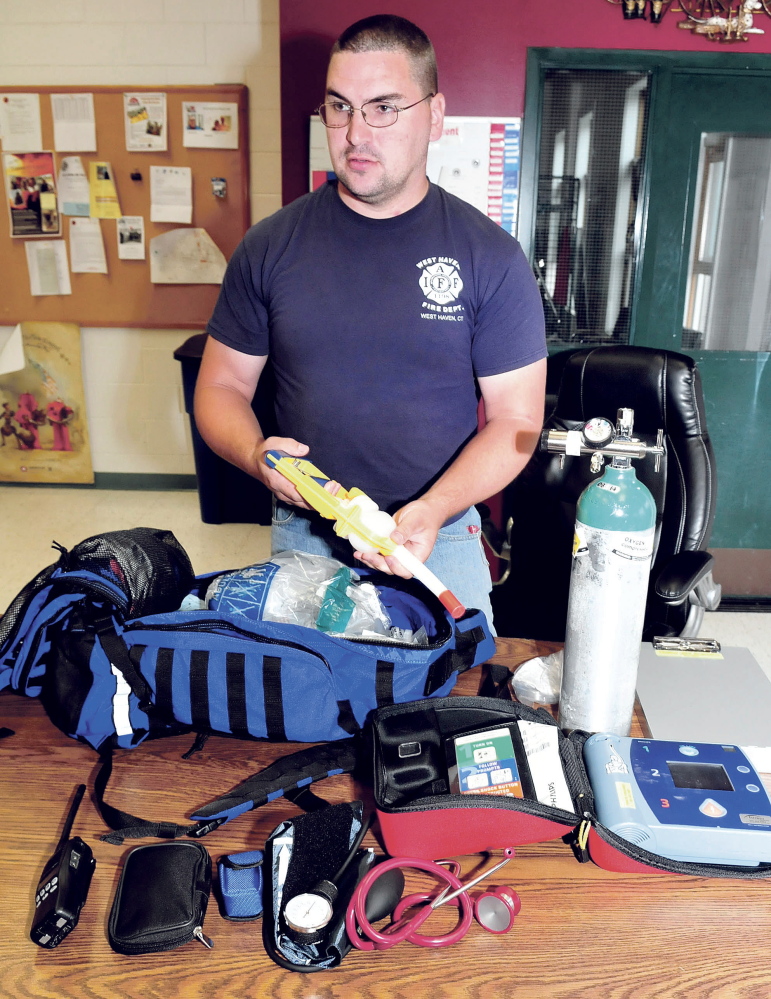A group of emergency medical service professionals volunteering to help fellow Vassalboro residents in medical emergencies reports answering 23 emergency calls in its first 21 days.
Some of the calls were for car crashes or cardiac arrest, situations in which time was critical
“We have definitely made the difference in the outcomes of patients, I’m almost positive of that,” said Dan Mayotte, a volunteer member and one of the organizers of the group.
The volunteers were organized to provide first response to medical emergencies in Vassalboro, which had no formally certified emergency medical first response.
In June, voters in Vassalboro approved the group’s initial request for $15,000, most of it to buy seven medical kits that are used in the initial response to a medical emergency. With 10 volunteers and several others who have inquired about helping, the organization will meet next month to look at ways to fund the purchase of at least three more kits, which cost about $1,000 each fully stocked.
Through the volunteer group’s first three weeks, the average response time of its members to a medical emergency has been 8.6 minutes, about four minutes less than the time it takes the town’s ambulance service provider, Delta Ambulance, to respond, according to Dan Mayotte, one of the volunteers and organizers of the group.
In a situation in which time is critical, the roughly four minutes saved when the Vassalboro First Responders arrive with an automated external defibrillator or a tank of oxygen can be a life saver, Mayotte said.
In addition to volunteering in Vassalboro, Mayotte is a paramedic for Delta, a lieutenant on the Waterville Fire Department and a volunteer firefighter in Vassalboro. All 10 Vassalboro volunteers have professional emergency medical response training.
On a rainy Monday in the Waterville Fire Department, Mayotte went through the $200, tear-proof medical kit, pulling out vital medical supplies from every nook and cranny of the blue backpack. In the front pouch, Mayotte pulled out a stethoscope, a blood-pressure gauge, a glucose reader and rubber gloves.
“I keep the everyday stuff I’ll use on every call in this front pouch,” Mayotte said, adding that providing a bag for each volunteer means responders choose how their equipment is organized and can reach for it quickly.
In Mayotte’s main storage compartment he keeps a defibrillator and an oxygen tank and all the necessary parts to get the two life-saving pieces of equipment into operation quickly, increasing the chances of survival or recovery for patients stricken with a sudden emergency.
Mayotte said the group purchased refurbished Phillips Automated External Defibrillators. Delta Ambulance has agreed to replace the temporary pads for the defibrillator, which run about $50-$60. In another pouch, trauma equipment, such as gauze pads, bandages, splints and tourniquets are at the ready. A separate pouch was full of ice packs.
Mayotte said typically at least two volunteers try to respond to the scene of each call. The first to arrive will administer medical care while the second will assist and start filling out the patient’s paperwork.
“If we can get two responders there, the second one can work on filling out the necessary paperwork, and for Delta it means shorter times on scene,” Mayotte said. “It gets the patient to the hospital quicker.”
Mayotte said there have been only two medical emergencies that no Vassalboro volunteer was able to respond to. Mayotte, who has worked as a 911 dispatcher, knows first-hand how traumatic those first minutes can be.
“For anyone who has to call 911 and had to wait, it always feels like a long time,” Mayotte said. “I’ve dealt with people who live in rural Somerset County, and they may be an hour away from a deputy. Some of the more serious patients we’ve had in the last couple days, it’s been good for them to have someone show up quick. Talking with dispatchers in Augusta, they’re thrilled about it.”
Mayotte said the first six months of the new volunteer group will be a test period and will be used to evaluate operations and build a baseline for response times, since the initial experience of 23 calls in the first 21 days represents a small sample size. The group is also hoping to expand, meeting in August to talk about fundraising ideas to purchase more medical kits so that additional members can be equipped for all emergencies.
“Even if we can get more medical packs and oxygen out on the roads, it’ll help,” Mayotte said, suggesting that having a kit without the expensive defibrillator is better than no medical kit at all for the three volunteers currently without kits.
“We’ve got more volunteers than we have equipment,” he said. “We’re working on putting together some public campaign to bring in donations.”
Jesse Scardina — 861-9239
Twitter: @jessescardina
Send questions/comments to the editors.



Success. Please wait for the page to reload. If the page does not reload within 5 seconds, please refresh the page.
Enter your email and password to access comments.
Hi, to comment on stories you must . This profile is in addition to your subscription and website login.
Already have a commenting profile? .
Invalid username/password.
Please check your email to confirm and complete your registration.
Only subscribers are eligible to post comments. Please subscribe or login first for digital access. Here’s why.
Use the form below to reset your password. When you've submitted your account email, we will send an email with a reset code.